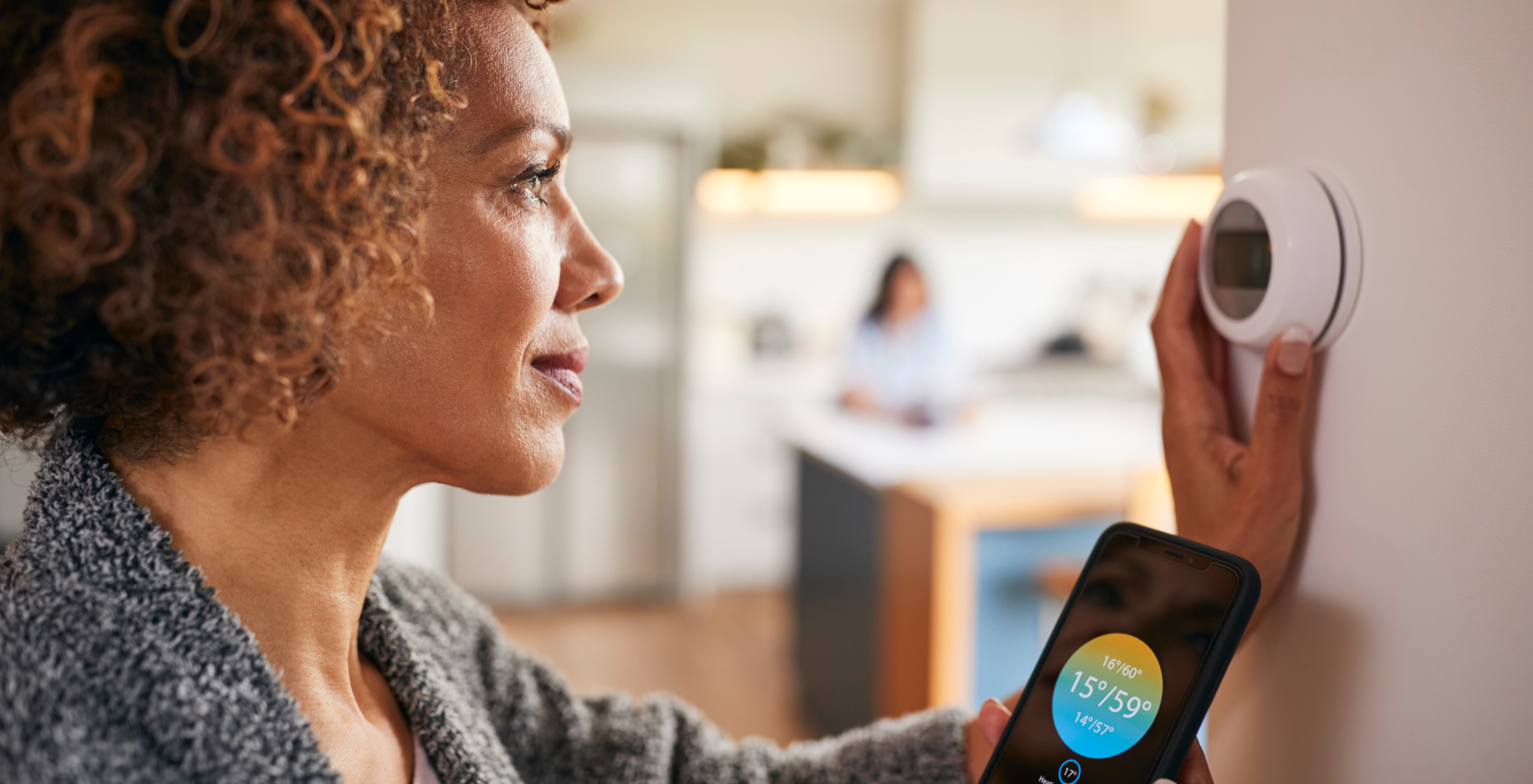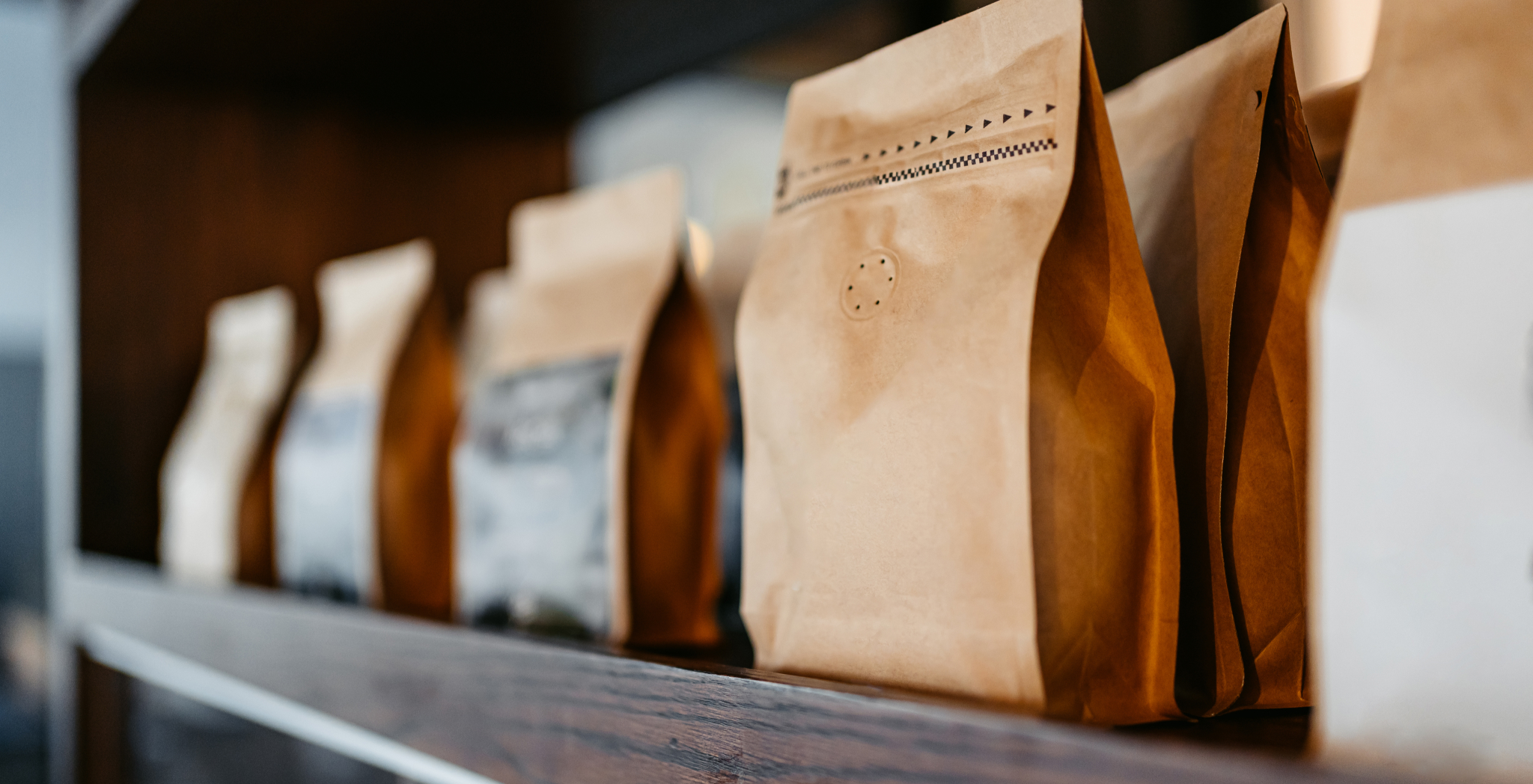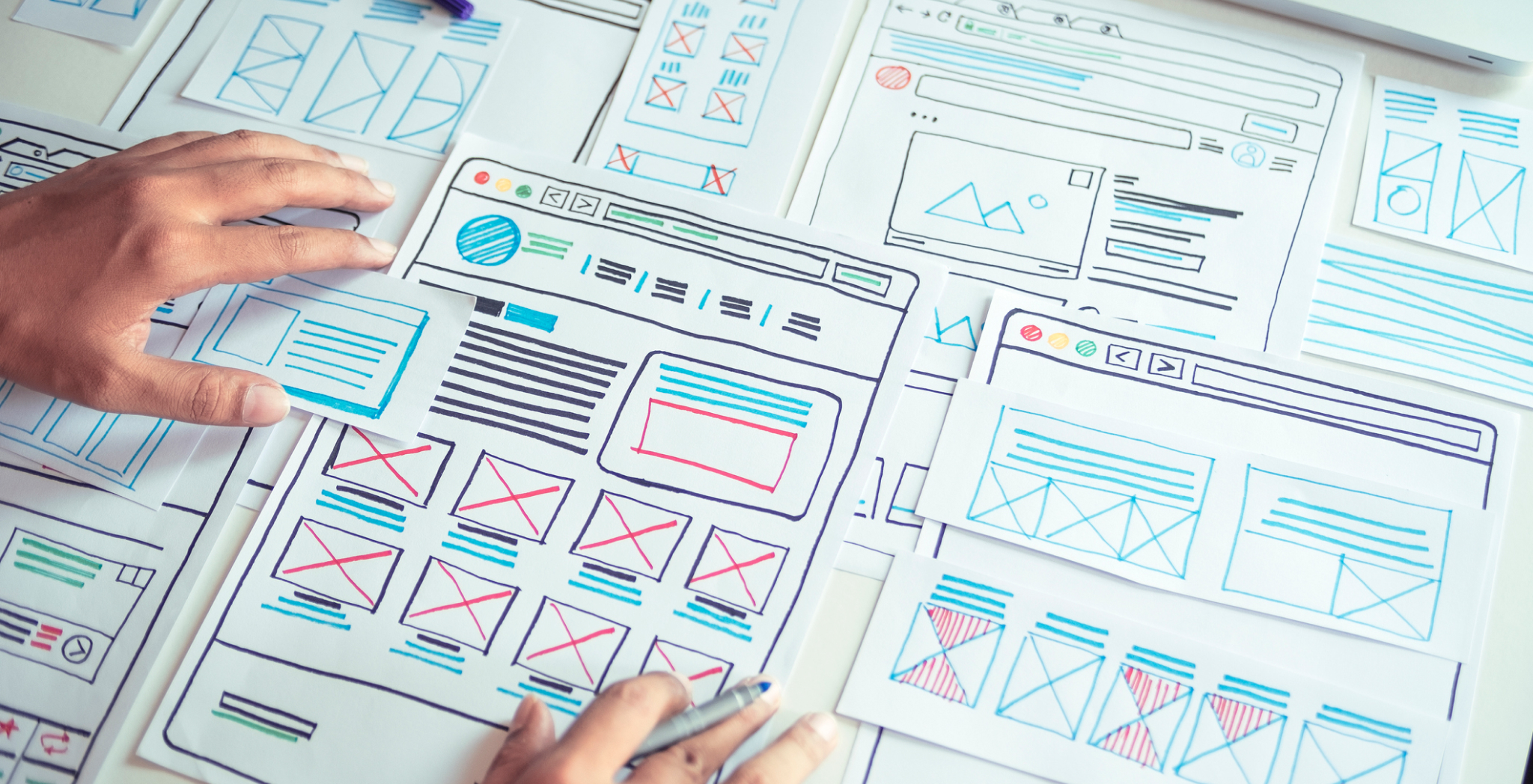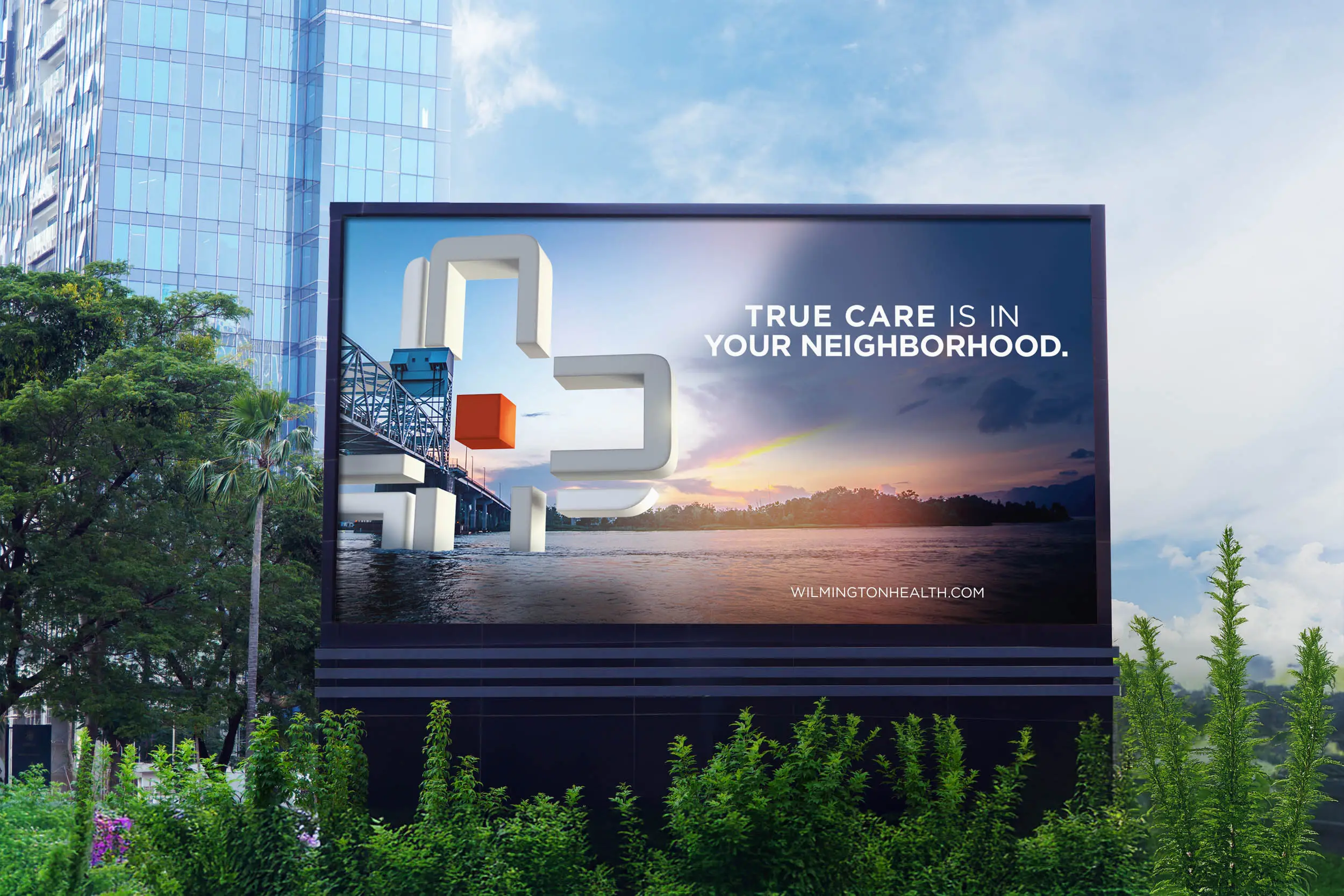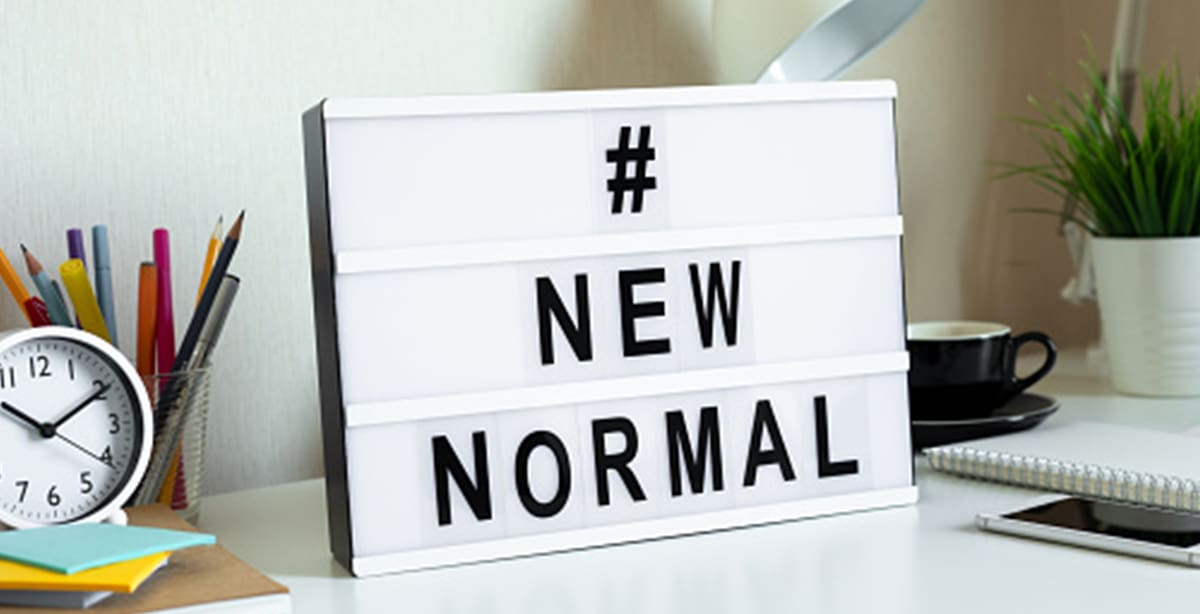
It’s hard to know yet which trends and habits during a global pandemic are temporary – and which will change for good.
Consumer mindset has shifted dramatically since March, mostly out of necessity. In the process, commerce has innovated and stumbled upon changes that could keep it afloat today – and possibly thrive tomorrow.
GlobalWebIndex is a market research SaaS company. It provides audience insight to publishers, media agencies, and marketers globally. Its Trend reports take a deep dive into pressing topics for brands and marketers. Its recent study examines the post-COVID-19 consumer mindset and the significance of attitude changes.
Data for good
Consumers had more to worry about than personal data. In two markets hard-hit early, the concern about the erosion of personal privacy online dropped, by 4% in Italy and 8% in China. In those countries, interest in ways companies use data also fell (5% in Italy, 7% in China.)
Concern about privacy had been on the rise since 2013. Chief in the switch: concerns of personal safety. Consumers are less likely to fret over data use in tracing apps. Decentralized models that Apple and Google use seem to quell concern. Is this comfort level temporary? In 2018, the General Data Protection Regulation and Cambridge Analytica’s use of personal data rose but steadied itself after the news subsided.
Exclusivity excluded
Consumers are less aware of personal status and self-image in the COVID-19 era. Economic downturns can sway public opinion of vanity metrics, but the sweeping nature of the infection, across geographic, political, and socio-economic markers, has forced many people inside. It’s tougher to show off from home. Those who do are often criticized for the flex of good fortune.
Social media likes have lost a bit of luster, and comfort has gained ground on personal image. Also, paywalls are coming down in places, as companies and governments furnish free services as an act of goodwill. Italy’s government opened a Digital Solidarity portal to educate and entertain people during the lockdown.
Consumers will expect such altruism post-COVID, too.
Solidarity has surpassed exclusivity for consumers. Displays of wealth or other exclusivity are seen as being tone-deaf to the world’s plight. Exclusive products aren’t as valued as a brand’s response to the world at large.
Globally, markets respond independently. This latest wave of research revealed brand consciousness fell in China (-11%) but rose slightly in Italy (6%).
Practicality is the new visibility.
Life in the slow lane
Power grids and sleep trackers prove what could be expected: Sleep is up during the pandemic. Talk about a major change: Sleep patterns since the Industrial Revolution have been withering.
Alarm clocks are gathering dust as the general pace of life slows. We’re less concerned about being in touch 24/7 or packing our schedules tightly. Gaming and TV streaming show growth, but overall online media usage is down. We’re spending more time in the kitchen and in pursuit of other interests. While China and much of the world spend more time cooking, reading is booming in South Korea (although some of that is through apps.)
Overall, cooks are up 8% since GWI’s first set of research. Those toiling away on apps? They’re down 15%.
Free time has fostered media fatigue brands must address. Puzzles sales are booming; brands such as Kraft Heinz and McDonald’s have answered the call with branded jigsaw puzzles.
The Brandon Agency CEO Scott Brandon says the pandemic clearly forced many to shop online for things they’d normally buy in-store.
“With restaurants closing and limiting service, consumers ate out less and cooked for themselves more,” Brandon said. “As these consumers became more comfortable with online purchasing, grocery delivery service increased dramatically.
“The question now is – what will happen as consumers begin to return to a more normal existence?”
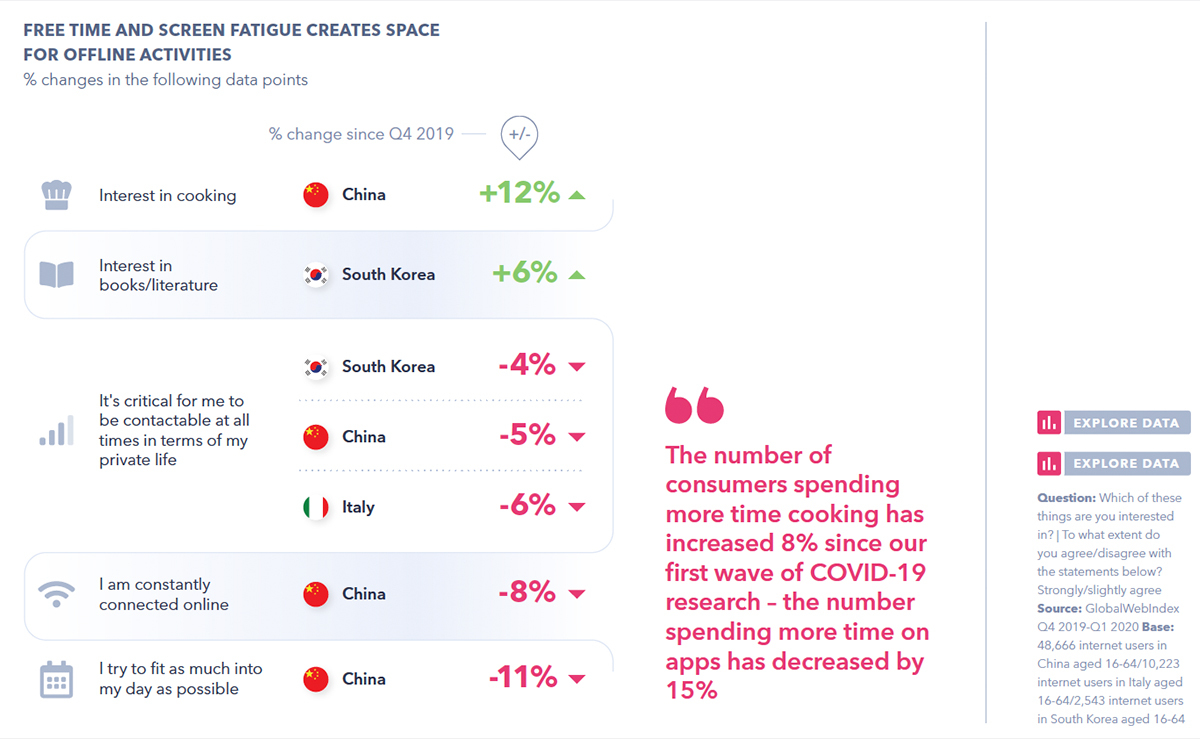
Tighten purse-strings
This one was inevitable, even for the most optimistic. Although consumers recognized an economic downturn was in the works, only recently can we see the impact personally. A post-affluent mindset has set in. Who wants to make shows of wealth in times like these? Since the first wave of GWI study, those who expect a big impact on their personal finances have risen by 43%.
Spontaneous spending has taken a dip, too. Rather than jump at the hot brands with hot advertising, consumers are taking more time to consider their spending.
Remember the “Keep Calm Carry On” movement after 2008? Expect similar sentiment for discretion and accountability after the pandemic.
A brand’s challenge of the future to consider now: How can you make non-essential products that are less likely to fly off the shelves feel more essential than extra?
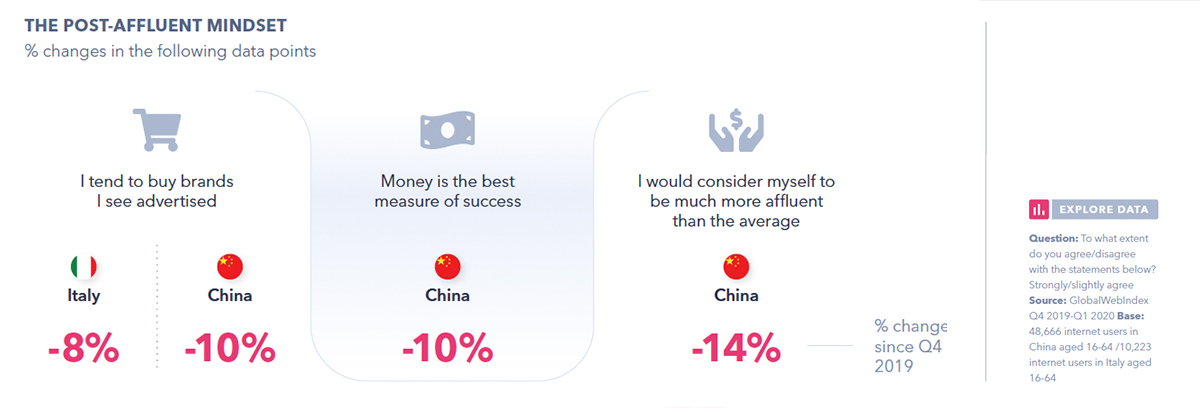
Reduced horizons
People aren’t traveling internationally. Our stay-at-home status extends to mindset too. With a focus on our immediate environment, global concerns haven’t waned, but interest in cosmopolitan lifestyles and other countries and their cultures has.
We’ve turned our attention to the home team because how our towns, states, and nations address the pandemic has the most lasting impact on our lives. Remember how panic buying dominated early COVID-19 storylines? We weren’t too keen on our neighbors as we hoarded disinfectant wipes and toilet paper. Since, growing sentiment for those around us, even nationally, indicates attitudes of solidarity within borders.
Brands aren’t blind to this trend of national pride.
Domestic travel is most appealing now, not only because of the decreased appeal of international travel, but also revived interest in our home countries. We want to help our local economies, and what better way than by booking rooms, ordering take-out on a trip, and visiting local attractions?
The Brandon Agency monitors these trends and uses this insight to serve its clients during the pandemic. FIREDISC, a propane-fueled portable cooker company out of Texas, is one. When COVID-19 lockdowns spread nationally, the agency marketed the cooker to people looking for ways to cook at home more. The result? Record sales.
Other clients benefitted from similar market clarity – specifically those in hospitality in the Daytona Beach (Fla.) and Myrtle Beach (S.C.) markets.
“We recognized that FIREDISC cookers could make cooking outdoors fun and easy for people who had to stay at home for meals more than maybe they were accustomed to,” said Todd Fuller, President of TBA Outdoors and the account director for FIREDISC. “The campaign struck a chord especially for those who wanted to see something good come out of the lockdown. They found a product that will remain relevant long after the pandemic ends.”
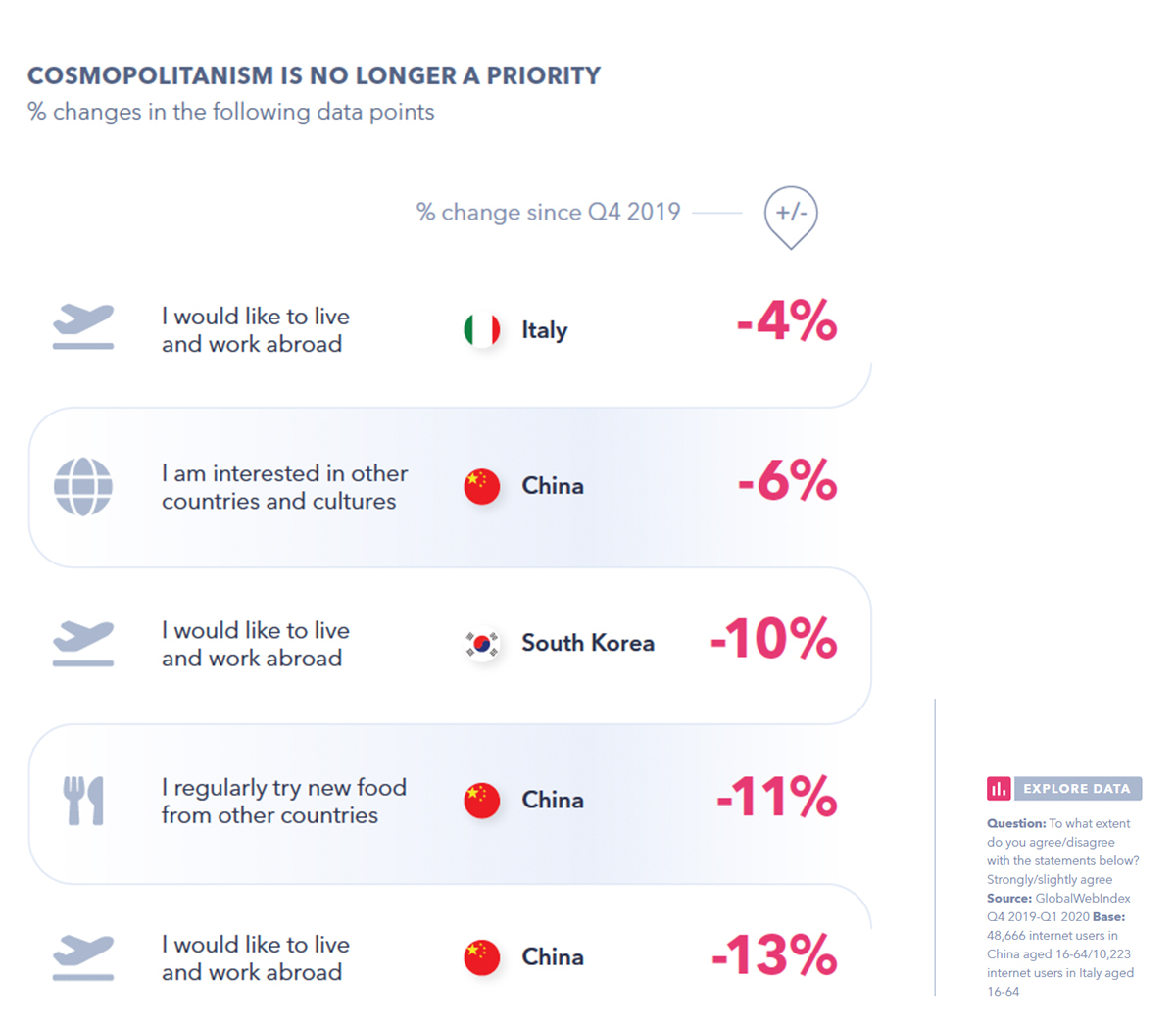
What can The Brandon Agency do for you?
The Brandon Agency has always focused on driving results, Scott Brandon said. “To do that, it is critical that we understand the consumer mindset as it is today, but also be able to anticipate it out into the future so that we can be ready well ahead of shifts,” Brandon said. “We do this using multiple tools in our tool kit.”
Trend Monitoring
Global Web Index
The Brandon Agency gets industry-leading consumer insight, 24 hours a day, every day of the year, with more than 250 creatives, data analysts, insights professionals, researchers, and software engineers, working together for a deep level of consumer insights.
“GWI does this in the most accessible way,” Brandon said. “Not only do they continually report on broad trends, we are able to go in and enter consumer data and have behavioral insights within minutes. It is an incredibly powerful resource that we are fortunate to be able to leverage.”
Proprietary research
The Brandon Agency has built an online customer panel since the late 1990s, of more than 800,000 people. This allows the agency to conduct proprietary research in an instant.
“If a client has a new business or product idea, we can test it,” Brandon said. “If we are seeing a trend, but want to be sure it is not just a fad, we can test it. We can also test the impact of certain marketing efforts at every stage of the consumer purchase journey. It is a powerful tool that few agencies have in-house.”
Client trend analysis
The Brandon Agency teams constantly share information across business categories and discuss what they see in their marketplace.
“It is interesting to see how changes in the B2B space sometimes impact the B2C space,” Brandon said. “Our focus on specific business categories, but not being focused on just 1 category, is an advantage here.”
Data analysis
The Brandon Agency constantly analyzes data flow from its work and clients. They use this data to identify significant shifts in consumer behavior. Also, to check against other clients’ data to determine how broad or narrow the shift is.
“This is a great tool that we have to be able to predict shifts,” Brandon said. “However, the most important tool we have is talented people. Our team is smart, savvy, competitive, responsive and tough. They know that their work matters and they are supremely invested in our clients’ success. That’s the real difference.”
The Brandon Agency is ready to help you adjust to the new consumer mindset. We have the data and the expertise to customize campaigns that put you in front of the right customer, with the right message. Call us today to discover what we can do for you.
By subscribing to our newsletter, you agree to our Privacy Policy.
